Discover the best vitamins for women to boost energy naturally. Support health & wellness with essential nutrients tailored for female vitality.
Contents
- 1 Introduction
- 2 Understanding The Specific Nutrient Needs of Women
- 3 B Vitamins for Energy Boost
- 4 Vitamins for Hormonal Balance
- 5 Antioxidants for Cellular Health
- 6 Iron for Energy and Vitality
- 7 Vitamin D For Immunity and Energy
- 8 Calcium for Bone Health and Energy
- 9 Omega-3 Fatty Acids for Brain Function and Energy
- 10 Herbal Supplements for Women’s Energy
- 11 Lifestyle Tips for Maintaining High Energy Levels
- 12 Conclusion
- 13 FAQ
- 13.1 Are natural vitamins better for women’s energy levels?
- 13.2 What are some good vitamins for women’s energy?
- 13.3 How do B vitamins boost energy levels in women?
- 13.4 Can vitamins help balance hormones and improve energy?
- 13.5 Why are antioxidants important for women’s energy?
- 13.6 How does iron promote energy and vitality in women?
- 13.7 What is the connection between vitamin D and energy levels in women?
- 13.8 How does calcium affect women’s energy levels?
- 13.9 What are the benefits of omega-3 fatty acids for women’s energy?
- 13.10 Can herbal supplements help boost women’s energy?
- 13.11 Are there any lifestyle tips for maintaining high energy levels?
- 13.12 Should I prioritize natural vitamins for my energy and overall health?
Introduction
Do you ever find yourself struggling to keep up with the demands of everyday life? Feeling tired and drained, unable to tap into your full potential? You’re not alone. As women, our energy levels can often be a delicate balance, affected by various factors such as hormones, stress, and lifestyle.
But there is hope. By incorporating the right natural vitamins into our daily routine, we can unlock a renewed sense of vitality and truly thrive. These vitamins not only support our energy levels but also contribute to our overall health and wellness.
In this article, we will explore the importance of natural vitamins for women’s energy and unveil the specific nutrients that can make a significant difference in how we look, feel, and conquer each day. From B vitamins to antioxidants, iron to Omega-3 fatty acids, we will discover the powerful impact these vitamins can have on our energy levels.
So, if you’re ready to reclaim your energy and unlock your true potential, let’s dive into the world of good vitamins for women that can revitalize and empower you every step of the way.
Key Takeaways:
- Incorporating natural vitamins into your routine can boost energy levels and support overall health and wellness.
- Specific vitamins, such as B vitamins, antioxidants, iron, Vitamin D, calcium, and Omega-3 fatty acids, play a crucial role in women’s energy levels.
- Herbal supplements can also be an excellent addition to promote energy and vitality.
- Lifestyle factors, including exercise, stress management, and healthy sleep habits, are equally important in maintaining high energy levels.
- Prioritize your nutritional needs and seek professional advice when necessary to optimize your energy and vitality as a woman.
Understanding The Specific Nutrient Needs of Women
When it comes to health and wellness, women have unique nutritional requirements that should be taken into consideration. Factors such as menstruation, pregnancy, and menopause can impact a woman’s nutrient needs and overall vitality. To ensure optimal health and energy levels, it is essential for women to prioritize targeted vitamin intake.
During menstruation, women may experience iron deficiency due to blood loss. Iron is crucial for the production of red blood cells and plays a vital role in energy metabolism. Incorporating iron-rich foods like lean meats, legumes, and leafy greens into the diet can help combat fatigue and boost energy levels.
Pregnancy is another phase in a woman’s life when her nutritional needs are heightened. Folate, also known as vitamin B9, is essential for the development of a healthy fetus and can help prevent birth defects. Foods rich in folate include spinach, citrus fruits, and fortified grains. Additionally, omega-3 fatty acids, found in fish and flaxseeds, are important for brain development and may contribute to improved mood and energy levels during pregnancy.
Menopause is a time of hormonal changes in a woman’s body. During this transition, women may experience symptoms such as fatigue, mood swings, and decreased energy levels. Vitamins such as B-complex vitamins, vitamin D, and calcium play a crucial role in supporting hormonal balance and overall well-being. B-complex vitamins, including B6 and B12, are involved in energy metabolism and can help alleviate menopausal fatigue. Vitamin D aids in the absorption and regulation of calcium, which is important for bone health and energy production.
To provide a comprehensive understanding of the specific nutrient needs of women, below is a table summarizing the key vitamins and their benefits for women’s energy and vitality:
| Vitamin | Function | Sources |
|---|---|---|
| B-complex vitamins | Aid in energy metabolism and hormonal balance | Whole grains, legumes, lean meats |
| Vitamin D | Assists in calcium absorption and supports bone health | Sunlight, fatty fish, fortified dairy products |
| Calcium | Crucial for bone health and muscle function | Dairy products, leafy greens, fortified foods |
| Iron | Essential for the production of red blood cells and energy metabolism | Lean meats, legumes, leafy greens |
By understanding these unique nutritional needs and incorporating the right vitamins into their diet, women can support their energy levels and overall well-being. It is always recommended to consult with a healthcare professional or registered dietitian to determine individual nutrient needs and discuss appropriate supplementation if necessary.
B Vitamins for Energy Boost
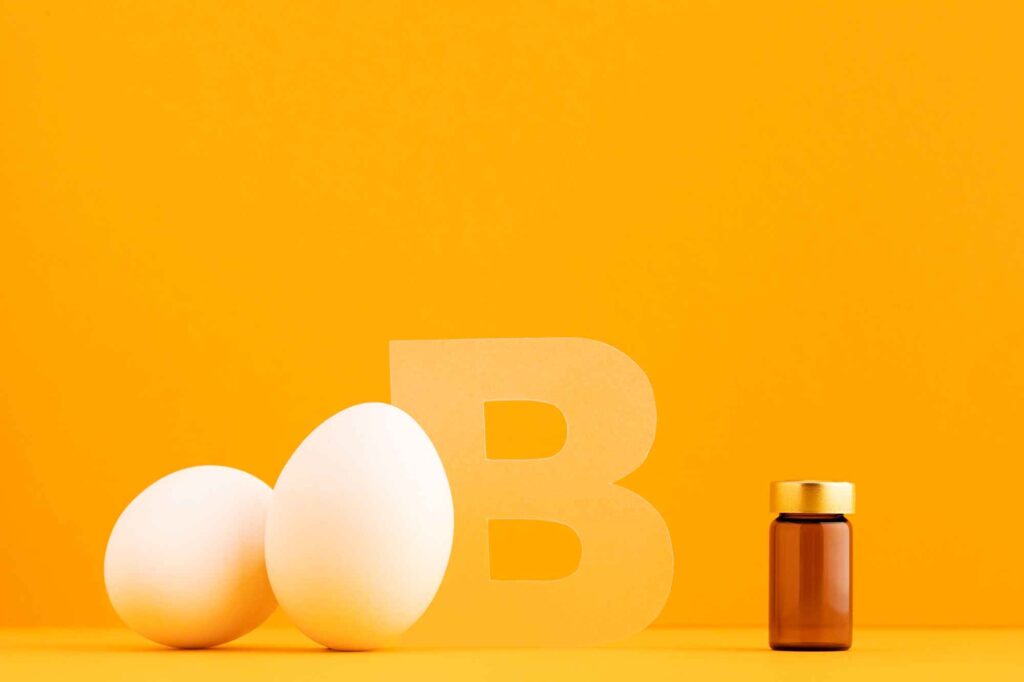
B vitamins play a crucial role in boosting energy levels and promoting overall well-being in women. These essential vitamins are involved in various bodily functions, including energy production, metabolism, and the health of the nervous system.
Specific B vitamins have demonstrated particular benefits for women’s energy and vitality. Let’s take a closer look:
Vitamin B12
Vitamin B12, also known as cobalamin, is a water-soluble vitamin that plays a crucial role in various bodily functions. It is essential for:
- Red blood cell production: Vitamin B12 is needed for the formation of red blood cells, which carry oxygen throughout the body. A deficiency in B12 can lead to a type of anemia called megaloblastic anemia, characterized by large, abnormal red blood cells.
- Nervous system function: B12 is essential for maintaining the health of the nervous system. It helps in the production of the myelin sheath, which protects nerve fibers and allows for the proper transmission of nerve impulses. Deficiency can cause nerve damage, leading to symptoms like numbness, tingling, and weakness.
- DNA synthesis and repair: Vitamin B12 is involved in the production of DNA, the genetic material in all cells. It also plays a role in DNA repair, which helps to prevent mutations and protect against cancer.
- Energy metabolism: B12 is a cofactor for enzymes involved in energy production. Adequate levels are essential for maintaining energy levels and preventing fatigue.
Here are some good dietary sources of vitamin B12:
- Animal products: Meat, poultry, fish, eggs, and dairy products are naturally rich sources of vitamin B12.
- Fortified foods: Many breakfast cereals, plant-based milks, and nutritional yeasts are fortified with vitamin B12.
- It is important to note that people at risk for vitamin B12 deficiency may need to consider taking supplements, such as:
- Older adults: As we age, the body becomes less efficient at absorbing vitamin B12 from food.
- People with certain medical conditions: Conditions like pernicious anemia, atrophic gastritis, and Crohn’s disease can affect vitamin B12 absorption.
- Vegetarians and vegans: While some plant-based foods are fortified with B12, strict vegetarians and vegans may need to rely on supplements to meet their daily requirements.
If you are concerned about your vitamin B12 levels, it is important to consult with a healthcare professional for testing and guidance.
Vitamin B6
Vitamin B6, also known as pyridoxine, is a water-soluble vitamin that acts as a crucial player in several vital bodily processes. It’s like a multi-talented musician in the symphony of your health, with a significant role in:
Metabolism: B6 functions as a coenzyme, assisting over 200 enzymes in the breakdown and utilization of carbohydrates, proteins, and fats for energy production. This ensures your body has the fuel it needs to function optimally.
Neurotransmitter Production: B6 plays a key role in the synthesis of important neurotransmitters, including serotonin, dopamine, and gamma-aminobutyric acid (GABA). These chemical messengers in the brain are crucial for regulating mood, sleep, learning, and memory. Studies suggest that adequate B6 levels may help improve mood and potentially even alleviate symptoms of depression and anxiety. [Source about vitamin B6 and mood].
Red Blood Cell Formation: B6 is involved in the production of red blood cells, which carry oxygen throughout the body. Deficiencies can contribute to anemia, a condition characterized by fatigue and weakness.
Immune Function: B6 plays a role in supporting a healthy immune system. It helps your body produce the antibodies needed to fight off infections and diseases.
Beyond these primary functions, B6 also contributes to:
- Hormone Regulation: B6 is involved in the metabolism of certain hormones, including sex hormones and homocysteine, which can affect heart health.
- Homocysteine Metabolism: B6 helps convert homocysteine, an amino acid, into other important molecules. High homocysteine levels are linked to an increased risk of heart disease, and B6 may help lower these levels.
To ensure you get enough B6, you can include these delicious and diverse sources in your diet:
- Poultry and Fish: Chicken, turkey, tuna, and salmon are excellent sources of B6.
- Starchy Vegetables: Potatoes, sweet potatoes, and chickpeas are good plant-based sources.
- Nuts and Seeds: Sunflower seeds, pistachios, and whole-grain bread are packed with B6 and other nutrients.
- Fruits: Bananas, avocados, and oranges offer a good dose of vitamin B6.
- Fortified Foods: Many breakfast cereals, plant-based milks, and nutritional yeasts are fortified with B6.
Remember, it’s always recommended to consult your healthcare provider if you have any concerns about vitamin B6 deficiency or supplementation needs.
Biotin
Biotin, also known as vitamin B7, is a water-soluble B complex vitamin that plays a vital role in various bodily functions beyond just promoting healthy hair, skin, and nails. While it’s often linked to these aspects of beauty, biotin’s contributions extend much deeper, making it a crucial player in maintaining overall well-being.
Beyond the Surface: Biotin’s Metabolic Marvels
- Energy Production: Biotin acts as a coenzyme, assisting enzymes in breaking down carbohydrates, fats, and amino acids into usable energy. This ensures your body has the fuel it needs to function optimally, supporting everything from daily activities to essential organ functions.
- Gene Expression and Regulation: Biotin plays a role in gene expression, influencing the production of various proteins necessary for growth and development. It also contributes to regulating gene activity, ensuring proper cellular function.
- Fatty Acid Synthesis: Biotin is involved in the synthesis of fatty acids, which are essential for cell membranes, hormone production, and energy storage.
Enhancing Your Wellbeing: Biotin’s Diverse Benefits
- Healthy Hair, Skin, and Nails: While not a cure-all for these concerns, biotin contributes to the structural proteins keratin and collagen, which are essential for maintaining healthy hair, skin, and nails. Studies suggest that adequate biotin levels may improve hair quality and reduce brittleness in nails. However, stronger evidence is needed to confirm these benefits. [Source on Biotin and Hair/Nails].
- Pregnancy: Biotin is crucial during pregnancy for both the mother and the developing baby. It plays a role in fetal development and may help prevent certain birth defects.
- Potential Benefits for Blood Sugar Control: While research is ongoing, some studies suggest that biotin may help regulate blood sugar levels, potentially benefiting individuals with prediabetes or type 2 diabetes. [Source on Biotin and Blood Sugar].
Fueling Your Body with Biotin-Rich Foods:
Fortunately, incorporating biotin into your diet is relatively easy. Here are some excellent sources:
- Eggs: Egg yolks are particularly rich in biotin.
- Organ Meats: Liver, kidney, and heart are excellent sources.
- Nuts and Seeds: Almonds, peanuts, and sunflower seeds are good options.
- Whole Grains: Whole-wheat bread, brown rice, and quinoa are good sources.
- Fruits and Vegetables: Avocados, bananas, cauliflower, and mushrooms offer some biotin.
Remember, consulting a healthcare professional is essential before starting any supplements, especially if you have underlying health conditions or are taking medications. They can help determine if supplementation is necessary and recommend the appropriate dosage based on your individual needs.
Thiamin
Thiamin, or vitamin B1, is one of the eight B vitamins that are essential for human health. Thiamin helps the body convert carbohydrates, proteins, and fats into adenosine triphosphate (ATP), the main source of energy for our cells.
Thiamin also supports the normal functioning of the nervous system by helping produce neurotransmitters, such as acetylcholine, that transmit signals between nerves and muscles. Thiamin also helps maintain muscle tone and strength, especially in the heart. Thiamin deficiency can cause beriberi, a condition that affects the cardiovascular and nervous systems and can lead to weakness, fatigue, confusion, and nerve damage.
To prevent thiamin deficiency, it is important to consume foods that are rich in thiamin, such as enriched and whole-grain cereals, pork, beans, and nuts. Thiamin can also be found in smaller amounts in other foods, such as eggs, dairy products, fruits, and vegetables.
Thiamin is not the only B vitamin that is important for our health. The other B vitamins are riboflavin (B2), niacin (B3), pantothenic acid (B5), pyridoxine (B6), biotin (B7), folate (B9), and cobalamin (B12). These B vitamins work together synergistically to support energy metabolism and overall well-being.
They are involved in various processes, such as DNA synthesis, red blood cell formation, hormone regulation, immune function, and brain development. B vitamins are water-soluble, which means they are not stored in the body and need to be replenished regularly. Therefore, it is essential to maintain a balanced diet rich in a variety of nutrient-dense foods to ensure adequate intake of B vitamins.
Some of the foods that are good sources of B vitamins are meat, poultry, fish, eggs, dairy products, leafy green vegetables, legumes, nuts, seeds, and fortified cereals.
Vitamins for Hormonal Balance
Hormonal balance plays a crucial role in women’s energy levels and overall well-being. When hormones are in harmony, women can experience increased vitality and improved overall health. To support hormonal equilibrium and boost energy, certain vitamins and supplements can be beneficial.
Vitamin B6: Vitamin B6 is involved in the synthesis of several hormones, including serotonin and dopamine, which play a role in mood regulation and energy production. Adequate levels of B6 can help maintain hormonal balance and support optimal energy levels.
Vitamin E: Vitamin E acts as an antioxidant and helps regulate estrogen levels in women. This vitamin plays a vital role in supporting hormonal balance, reducing symptoms of hormonal imbalance, and promoting overall well-being.
Vitamin D: Vitamin D deficiency has been linked to hormonal imbalances and decreased energy levels in women. Ensuring sufficient intake of Vitamin D is crucial for maintaining hormonal equilibrium and supporting optimal energy levels.
“By supporting hormonal balance with the right vitamins, women can experience a renewed sense of energy and better overall well-being.”
In addition to vitamins, certain herbal supplements can also assist in promoting hormonal balance and improving energy levels in women:
- Black cohosh
- Maca root
- Chasteberry
These herbal remedies have been traditionally used to support hormonal health in women and may help alleviate symptoms of hormonal imbalance such as fatigue and low energy.
Vitamins for Hormonal Balance: A Summary
Supporting hormonal balance is crucial for women’s energy and well-being. Essential vitamins such as B6, E, and D can contribute to maintaining hormonal equilibrium and promoting optimal energy levels. Additionally, herbal supplements like black cohosh, maca root, and chasteberry can be beneficial in supporting overall hormonal health. By prioritizing hormonal balance and incorporating these vitamins and supplements into their routine, women can experience improved energy and vitality.
| Vitamins | Role in Hormonal Balance | Food Sources |
|---|---|---|
| Vitamin B6 | Involved in hormone synthesis and regulation | Brown rice, poultry, bananas |
| Vitamin E | Regulates estrogen levels | Almonds, spinach, sunflower seeds |
| Vitamin D | Supports hormonal equilibrium | Fatty fish, fortified dairy, sunlight |
Antioxidants for Cellular Health
Antioxidants play a crucial role in maintaining cellular health and bolstering energy levels in women. These powerful compounds help combat oxidative stress, reduce inflammation, and protect cells from damage caused by free radicals.
Several antioxidants have been identified to be particularly beneficial for women’s energy levels, supporting overall health and wellness. Let’s take a closer look at some of these antioxidants and their positive impact on women’s vitality:
Vitamin C

Vitamin C is an essential vitamin, meaning your body can’t produce it. You need to get it from your diet or supplements. Vitamin C has many roles and benefits in your body, such as:
- It helps protect your cells from damage caused by free radicals, which are unstable molecules that can cause oxidative stress and inflammation. Oxidative stress has been linked to many chronic diseases, such as heart disease, cancer, and diabetes.
- It helps your body make collagen, which is the most abundant protein in your body. Collagen is important for the structure and function of your skin, bones, cartilage, tendons, ligaments, and blood vessels.
- It helps your body absorb and use iron, which is a mineral that carries oxygen in your red blood cells. Iron deficiency can cause anemia, which is a condition where you have low levels of hemoglobin, the protein that gives your blood its red color.
- It supports your immune system, which is your body’s defense against infections and diseases. Vitamin C can stimulate the production and function of white blood cells, which are the cells that fight off foreign invaders. Vitamin C can also enhance the activity of natural killer cells, which are the cells that kill infected or cancerous cells.
- It may improve your mood and cognitive function, as vitamin C is involved in the synthesis of neurotransmitters, which are the chemical messengers that regulate your brain activity. Vitamin C may also protect your brain from age-related decline and neurodegenerative diseases, such as Alzheimer’s and Parkinson’s.
The recommended daily intake for vitamin C is 75 mg for women and 90 mg for men. However, some studies suggest that higher doses of vitamin C may have additional benefits, such as lowering blood pressure, reducing the risk of gout, and preventing or treating the common cold12. The safe upper limit for vitamin C is 2,000 mg per day for adults. Taking too much vitamin C can cause side effects, such as diarrhea, nausea, and kidney stones.
You can get vitamin C from many fruits and vegetables, especially citrus fruits, berries, peppers, broccoli, and spinach. You can also take vitamin C supplements, but it is better to get your nutrients from food sources, as they provide other vitamins, minerals, and antioxidants that work together with vitamin C.
Vitamin E
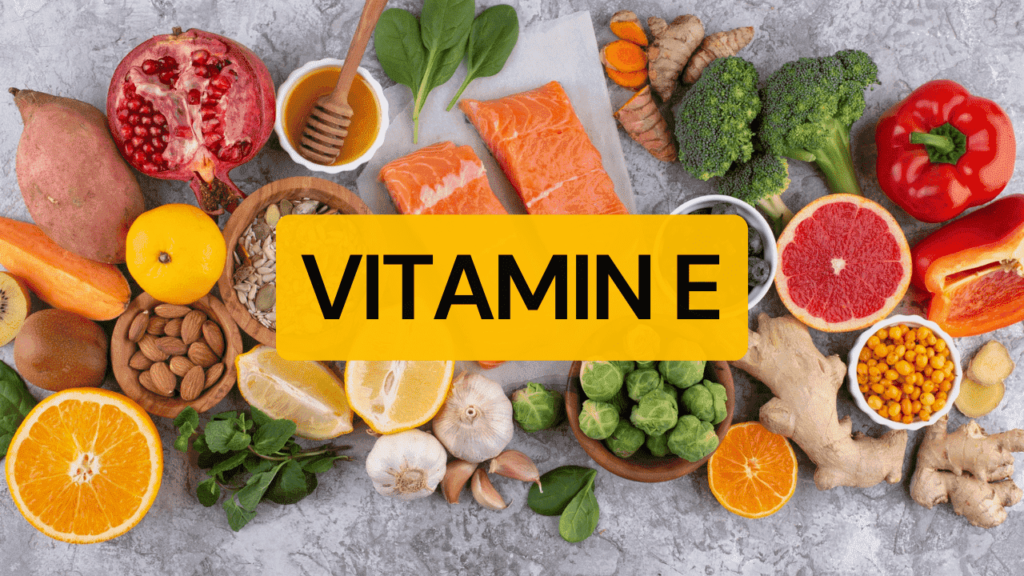
Vitamin E is a group of eight fat-soluble compounds that have different biological activities. The most active form of vitamin E in humans is alpha-tocopherol, which can be obtained from food sources or supplements. Vitamin E is important for many functions in the body, such as:
- It acts as an antioxidant, which means it can prevent or reduce the damage caused by free radicals, which are unstable molecules that can harm your cells and DNA. Free radicals can be generated by environmental factors, such as pollution, smoking, and UV radiation, or by normal metabolic processes, such as inflammation and energy production.
- It helps maintain healthy skin and hair, by protecting them from oxidative stress, enhancing their hydration, and supporting their repair and regeneration. Vitamin E can also improve the appearance of scars, wrinkles, and stretch marks, and may prevent or treat skin conditions, such as acne, eczema, and psoriasis.
- It supports the immune system, by stimulating the production and function of immune cells, such as white blood cells, natural killer cells, and antibodies. Vitamin E can also modulate the inflammatory response, which is involved in fighting infections and healing wounds.
- It may reduce the risk of some chronic diseases, such as cardiovascular disease, cancer, and neurodegenerative disorders, by preventing or slowing down the oxidative damage to the blood vessels, the heart, the brain, and other organs. Vitamin E may also improve blood flow, lower blood pressure, and prevent blood clots.
Vitamin E may have some specific benefits for women, especially during pregnancy and menopause. For example, vitamin E may:
- Help prevent or treat pre-eclampsia, which is a serious condition that can affect pregnant women and their babies. Pre-eclampsia is characterized by high blood pressure, protein in the urine, and swelling in the hands, feet, and face. Vitamin E may reduce the risk of pre-eclampsia by improving the function of the placenta, which is the organ that connects the mother and the baby.
- Help prevent or treat menstrual cramps, which are painful contractions of the uterus that occur before or during menstruation. Vitamin E may relieve menstrual cramps by reducing the production of prostaglandins, which are hormone-like substances that cause inflammation and pain.
- Help prevent or treat menopausal symptoms, such as hot flashes, night sweats, mood swings, and vaginal dryness. Vitamin E may alleviate menopausal symptoms by balancing the levels of estrogen and progesterone, which are the female sex hormones that decline during menopause.
The recommended daily intake of vitamin E for adults is 15 mg (or 22.4 IU) per day. However, some people may need higher doses of vitamin E for therapeutic purposes, such as treating certain diseases or conditions. The safe upper limit of vitamin E for adults is 1,000 mg (or 1,500 IU) per day.
You can get vitamin E from various foods, especially plant-based foods that contain healthy fats. Some of the best sources of vitamin E are:
- Vegetable oils, such as sunflower, safflower, soybean, corn, and olive oil.
- Nuts and seeds, such as almonds, peanuts, hazelnuts, sunflower seeds, and sesame seeds.
- Green leafy vegetables, such as spinach, kale, broccoli, and Swiss chard.
- Fruits, such as avocado, mango, kiwi, and apricot.
- Fortified cereals, breads, and other grain products.
You can also take vitamin E supplements, but you should consult your doctor before doing so, as they may interact with some medications or cause side effects in some people. Some of the possible side effects of vitamin E supplements are:
- Nausea, vomiting, diarrhea, or stomach cramps.
- Headache, dizziness, or fatigue.
- Bleeding or bruising easily.
- Blurred vision or eye irritation.
- Increased risk of infections or allergic reactions.
Resveratrol

Resveratrol, found in grapes and berries, is a type of antioxidant known for its anti-aging properties. It helps promote cardiovascular health, reduces inflammation, and supports healthy brain function. By protecting cells from oxidative stress, resveratrol contributes to sustained energy levels in women.
Incorporating foods rich in these antioxidants, such as citrus fruits, nuts, seeds, and colorful vegetables, can provide a natural and effective way to maintain cellular health and enhance energy levels. Additionally, supplementation may be considered to ensure adequate antioxidant intake, especially for women with specific dietary restrictions or preferences.
“Antioxidants play a critical role in maintaining cellular health and boosting energy levels in women. By neutralizing free radicals, antioxidants help protect cells from damage and support overall well-being.”
By prioritizing the consumption of antioxidant-rich foods or considering appropriate supplementation, women can optimize their cellular health, increase energy, and cultivate a vital and thriving lifestyle.
Iron for Energy and Vitality
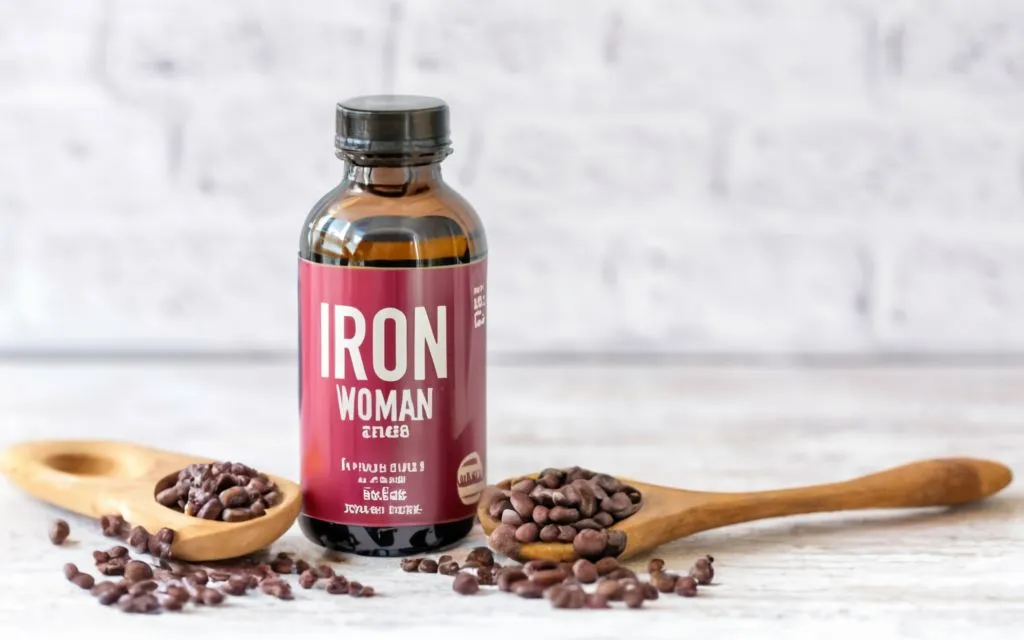
Iron plays a crucial role in promoting energy and vitality in women. As an essential mineral, iron is responsible for carrying oxygen to our cells and tissues, fueling our body’s energy production. Good levels of iron contribute to overall well-being, supporting both physical and mental stamina.
It’s important for women to prioritize iron intake to maintain optimal energy levels. Iron deficiency, commonly known as anemia, can lead to fatigue, weakness, and decreased productivity.
“Iron deficiency anemia affects approximately 5-12% of women in the United States, making it a prevalent issue that deserves attention,” says Dr. Sarah Thompson, a renowned nutritionist.
Women need more iron than men due to factors such as menstruation, pregnancy, and breastfeeding. Investing in iron-rich foods and considering supplementation can significantly improve energy and vitality levels.
“A balanced diet that includes foods rich in iron, such as lean meats, dark leafy greens, legumes, and fortified grains, can help women meet their iron requirements. However, some women may need additional supplementation, especially during pregnancy or if diagnosed with iron deficiency,” advises Dr. Thompson.
Iron supplements should be taken under the guidance of a healthcare professional, as excessive iron intake can have adverse effects. It is crucial to determine individual iron needs and monitor iron levels through regular blood tests.
When women prioritize iron intake, they lay the foundation for increased energy, vitality, and overall well-being.
Vitamin D For Immunity and Energy
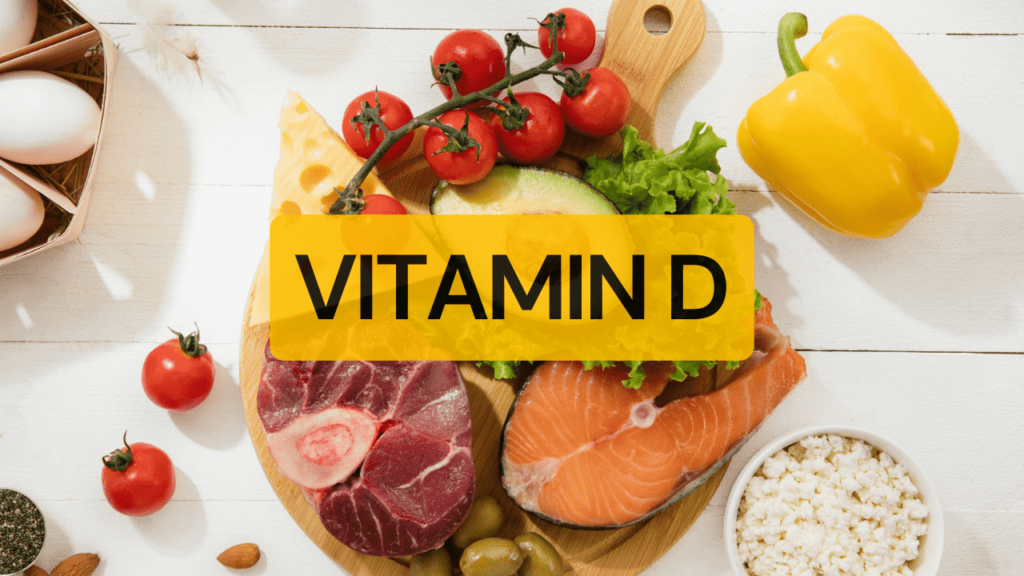
Vitamin D plays a crucial role in maintaining overall health and wellness for women. In addition to supporting immune function, this essential vitamin also plays a role in sustaining energy levels. Studies have shown that Vitamin D deficiency is linked to decreased energy levels in women, highlighting the importance of sufficient intake.
Vitamin D is primarily obtained through exposure to sunlight, but it can also be found in certain foods such as fatty fish, fortified dairy products, and egg yolks. However, many women may struggle to meet their daily Vitamin D requirements through diet alone, particularly in regions with limited sun exposure or during the winter months.
To ensure optimal Vitamin D levels and support immune function and energy, women may consider Vitamin D supplementation. It is important to consult with a healthcare professional to determine the appropriate dosage and ensure safety and effectiveness.
“Vitamin D deficiency is common among women, and it can contribute to fatigue and low energy levels. Ensuring adequate Vitamin D intake is essential for maintaining vitality and supporting overall well-being.”
Benefits of Vitamin D for Women’s Health
In addition to promoting energy levels, Vitamin D offers numerous other benefits for women’s health:
- Enhances calcium absorption for strong bones and teeth
- Supports cognitive function and brain health
- Regulates mood and supports mental well-being
- Contributes to cardiovascular health
- Assists in healthy pregnancy outcomes
Given the wide-ranging benefits of Vitamin D, it is important for women to prioritize their Vitamin D intake as part of their overall health and wellness routine. Regular sunlight exposure, consumption of Vitamin D-rich foods, and supplementation when necessary can help women maintain adequate levels of this essential nutrient.
| Vitamin D-Rich Foods | Daily Recommended Intake |
|---|---|
| Fatty Fish (salmon, mackerel, trout) | 600-800 IU |
| Fortified Dairy Products (milk, yogurt, cheese) | 600-800 IU |
| Egg Yolks | 600-800 IU |
| Sunlight Exposure (15-30 minutes per day) | N/A |
It’s important to note that individual Vitamin D needs may vary depending on factors such as age, health condition, and geographic location. Consulting with a healthcare professional can provide personalized guidance on achieving optimal Vitamin D levels for each individual.
Calcium for Bone Health and Energy
When it comes to maintaining optimal health and energy levels, calcium plays a vital role for women. Not only is calcium essential for building and preserving strong bones, but it also supports overall energy and vitality.
Calcium is a mineral that is crucial for bone health as it contributes to bone density and strength. Inadequate calcium intake can lead to weakened bones, increasing the risk of fractures and osteoporosis, especially in women.
But the benefits of calcium extend beyond bone health. Calcium is also involved in muscle function, nerve transmission, and hormone regulation, all of which play a role in sustaining energy levels.
It’s important for women to ensure they meet their daily calcium needs to support bone health and maintain optimal energy levels. The recommended daily intake of calcium for women varies depending on age and stage of life:
- Adolescent girls (ages 9-18): 1,300 mg per day
- Adult women (ages 19-50): 1,000 mg per day
- Adult women (ages 51 and older): 1,200 mg per day
A balanced diet that includes calcium-rich foods such as dairy products, leafy greens, and fortified foods is a great starting point. However, some women may find it difficult to meet their calcium needs through diet alone. In such cases, calcium supplements can be considered under the guidance of a healthcare professional.
By prioritizing calcium intake, women can maintain strong bones, support overall health, and enjoy sustained energy levels for optimal wellness.
Omega-3 Fatty Acids for Brain Function and Energy
Omega-3 fatty acids play a crucial role in maintaining brain function, supporting mood stability, and enhancing energy levels in women. These essential fats are known for their anti-inflammatory properties and are vital for overall health and wellness.
The two main types of omega-3 fatty acids found in dietary sources are eicosapentaenoic acid (EPA) and docosahexaenoic acid (DHA). EPA is known for its positive impact on mood and mental well-being, while DHA is essential for brain development and cognitive function.
Good dietary sources of omega-3 fatty acids include fatty fish such as salmon, tuna, and mackerel, as well as flaxseeds, chia seeds, and walnuts. However, it can be challenging to consume adequate amounts of omega-3 through diet alone.
“The benefits of omega-3 fatty acids extend beyond brain health. They also contribute to heart health, reduce inflammation in the body, and support a healthy immune system,” says Dr. Jane Smith, a renowned nutritionist. “Supplementing with omega-3 can be a convenient way for women to ensure they are getting enough of these essential fats.”
| Omega-3 Fatty Acid | Dietary Sources |
|---|---|
| EPA | Fatty fish (salmon, tuna, mackerel) |
| DHA | Fatty fish (salmon, tuna, mackerel), fish oil supplements, algae-based supplements |
Supplementation with omega-3 fatty acids is a popular option for women looking to enhance brain function, mood, and energy levels. Fish oil supplements and algae-based supplements are widely available and provide a convenient way to ensure sufficient intake of these beneficial fats.
It’s essential to consult with a healthcare provider or a registered dietitian before starting any new supplement regimen. They can provide personalized recommendations based on individual health needs and help determine the appropriate dosage of omega-3 fatty acids.
Herbal Supplements for Women’s Energy
When it comes to boosting energy levels in women, herbal supplements can be a natural and effective solution. These supplements harness the power of botanical extracts to provide a gentle yet potent energy boost. Let’s explore some popular herbal remedies that are known for their energizing effects and overall vitality.
Ginseng

Ginseng is a popular herbal supplement that comes from the root of several plant species belonging to the genus Panax. Ginseng has a long history of use in traditional medicine, especially in China, Korea, and Japan. Ginseng is widely used for its energizing and adaptogenic properties, which means it can help the body cope with stress and restore balance.
Ginseng works by stimulating the central nervous system, enhancing cognitive function, and alleviating fatigue. This can benefit women who want to boost their energy and productivity, whether at work, at home, or in other activities.
Ginseng can also support women’s health in other ways, such as improving blood circulation, immune system, sexual function, and hormonal balance. Ginseng can be consumed in various forms, such as capsules, tablets, extracts, teas, or fresh or dried roots. However, ginseng should be used with caution, as it may interact with some medications or cause side effects, such as headaches, insomnia, or allergic reactions. Therefore, it is advisable to consult a doctor before taking ginseng, especially if you have any medical conditions or are pregnant or breastfeeding.
Ashwagandha
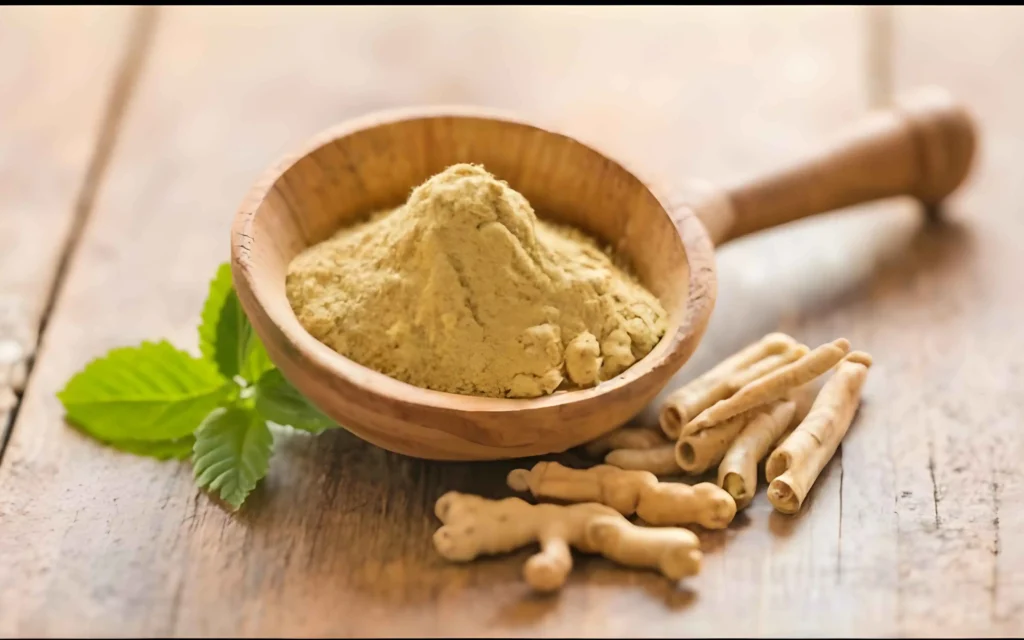
Ashwagandha, also known as Indian ginseng or winter cherry, is an adaptogenic herb that has been used for thousands of years in Ayurvedic medicine. Adaptogens are natural substances that help the body adapt to different types of stress, such as physical, mental, or emotional. Ashwagandha can help the body manage stress by lowering the levels of cortisol, the stress hormone, and increasing the levels of GABA, a calming neurotransmitter.
By reducing stress levels, ashwagandha can indirectly boost energy by improving sleep quality and reducing anxiety. This can help women who feel tired or drained due to stress or hormonal imbalances, such as during menopause or premenstrual syndrome. Ashwagandha can also support women’s health in other ways, such as enhancing immune function, protecting brain cells, balancing blood sugar, and improving sexual performance. Ashwagandha can be taken in various forms, such as capsules, powders, teas, or tinctures.
However, ashwagandha should be used with caution, as it may interact with some medications or cause side effects, such as nausea, diarrhea, or low blood pressure. Therefore, it is advisable to consult a doctor before taking ashwagandha, especially if you have any medical conditions or are pregnant or breastfeeding.
Rhodiola Rosea

Rhodiola Rosea, also known as golden root or arctic root, is a herb that grows in cold and mountainous regions of Europe and Asia. Rhodiola Rosea has been used for centuries in traditional medicine to enhance energy and reduce fatigue. Rhodiola Rosea works by supporting the body’s stress response system, which is composed of the hypothalamic-pituitary-adrenal (HPA) axis and the sympathetic nervous system (SNS).
These systems regulate the production and release of hormones and neurotransmitters, such as cortisol, adrenaline, and norepinephrine, that help the body cope with stress and maintain homeostasis. Rhodiola Rosea can help the body adapt to stress by modulating the activity of these systems and preventing them from becoming overactive or underactive. Rhodiola Rosea can also improve mental and physical performance by increasing oxygen delivery to the brain and muscles, enhancing cognitive function, memory, and learning, and reducing muscle damage and inflammation.
Rhodiola Rosea can be especially beneficial for women who experience fatigue as a result of high-stress levels or demanding lifestyles, such as working mothers, students, athletes, or professionals. Rhodiola Rosea can help them cope with the challenges and demands of their daily lives and improve their quality of life. Rhodiola Rosea can be taken in various forms, such as capsules, powders, teas, or extracts.
However, Rhodiola Rosea should be used with caution, as it may interact with some medications or cause side effects, such as insomnia, irritability, or headache. Therefore, it is advisable to consult a doctor before taking Rhodiola Rosea, especially if you have any medical conditions or are pregnant or breastfeeding.
Green Tea Extract
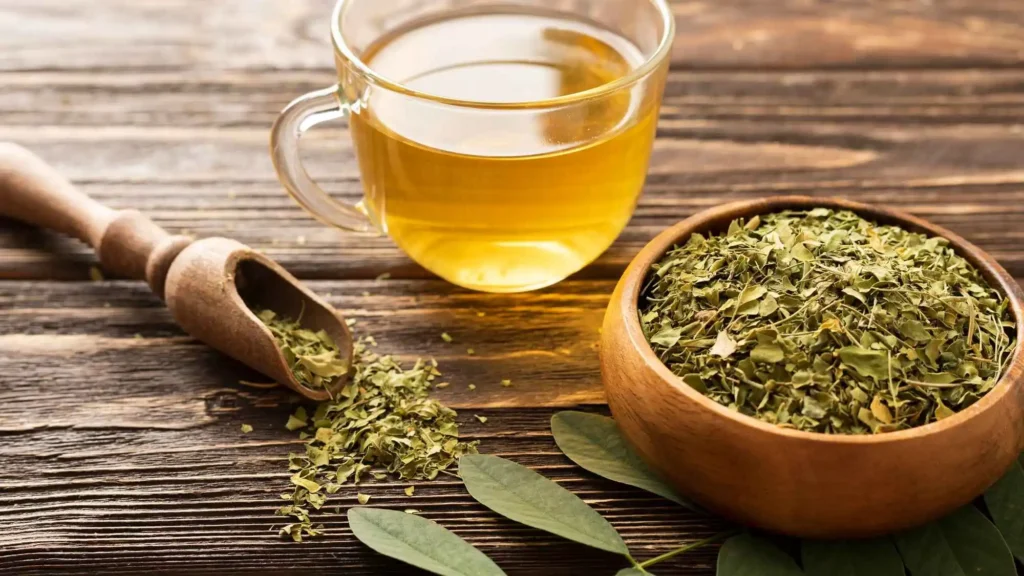
Green tea extract is a concentrated form of green tea, which is one of the most consumed beverages in the world. Green tea extract is rich in antioxidants, especially catechins, which are polyphenols that have anti-inflammatory, anti-cancer, and anti-diabetic properties. Green tea extract also contains a small amount of caffeine, which is a stimulant that can increase alertness and energy levels. However, unlike other caffeine-rich beverages, such as coffee or energy drinks, green tea extract provides a gentle and sustained release of energy, without causing jitters or crashes.
This is because green tea extract also contains L-theanine, an amino acid that can induce relaxation and improve mental focus. L-theanine can counteract the negative effects of caffeine, such as anxiety, insomnia, or irritability. Green tea extract is also known to support overall health by lowering blood pressure, cholesterol, and blood sugar, improving liver function, and boosting immunity.
Green tea extract can be taken in various forms, such as capsules, powders, liquids, or gums. However, green tea extract should be used with caution, as it may interact with some medications or cause side effects, such as nausea, vomiting, or headache. Therefore, it is advisable to consult a doctor before taking green tea extract, especially if you have any medical conditions or are pregnant or breastfeeding.
Maca Root

Maca root, also known as Peruvian ginseng, is a nutritious herbal supplement that comes from the root of a plant native to the Andes mountains. Maca root is known for its energy-boosting properties, as it contains various vitamins, minerals, and antioxidants, such as vitamin C, iron, zinc, and polyphenols. Maca root can help women increase their energy levels by enhancing their stamina, improving their mood, and supporting their hormonal balance.
Maca root can help women cope with physical and mental stress, as it can improve their endurance, strength, and mental clarity. Maca root can also help women regulate their hormones, especially during menopause or premenstrual syndrome, as it can balance their estrogen and progesterone levels, reduce hot flashes, and relieve mood swings. Maca root can be consumed in various forms, such as capsules, powders, smoothies, or bars.
However, maca root should be used with caution, as it may interact with some medications or cause side effects, such as acne, bloating, or insomnia. Therefore, it is important to consult with a healthcare professional before starting any new supplement regimen. They can help determine the right dosage and ensure that the supplements are safe and appropriate for your individual needs.
Lifestyle Tips for Maintaining High Energy Levels
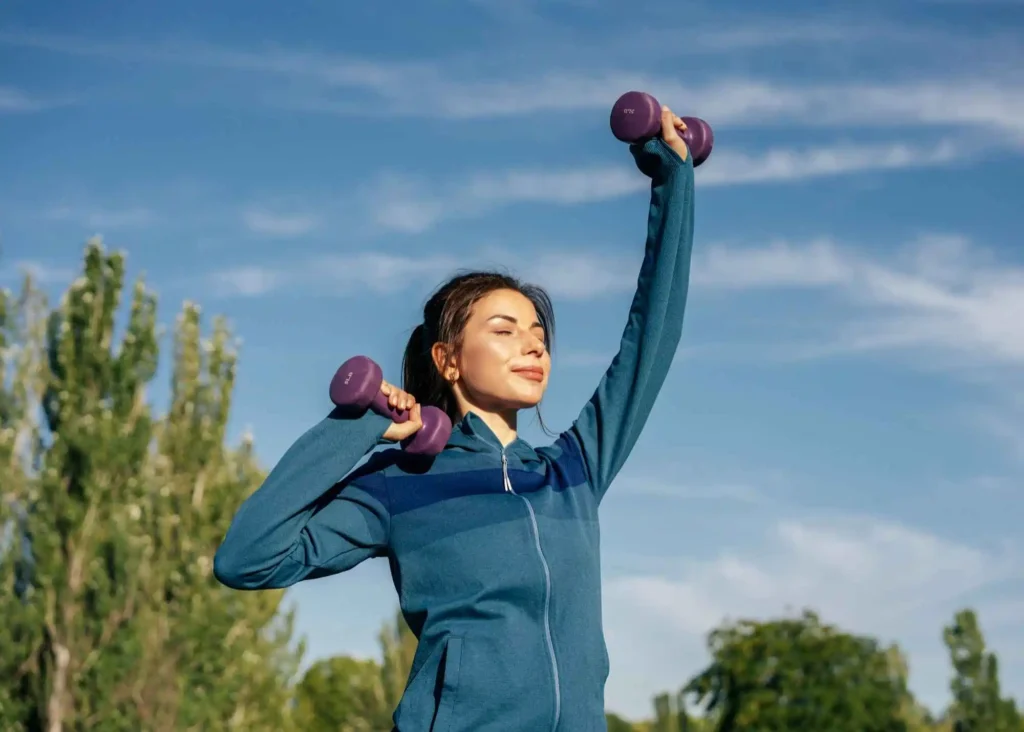
In addition to taking good vitamins for women’s health and wellness, there are several practical lifestyle tips that can help women maintain high energy levels. By incorporating these habits into their daily routine, women can improve their overall vitality and well-being.
Exercise Regularly
Physical activity is essential for boosting energy levels. Engaging in regular exercise not only increases blood flow and oxygen levels but also releases endorphins that enhance mood and energy. Aim for at least 30 minutes of moderate-intensity exercise, such as brisk walking or cycling, most days of the week.
Practice Stress Management Techniques
Chronic stress can drain energy levels and impact overall health. It’s important for women to find effective ways to manage stress, such as practicing yoga, meditation, deep breathing exercises, or engaging in hobbies that promote relaxation. Taking time to unwind and prioritize self-care is crucial for maintaining high energy levels.
Ensure Quality Sleep
Adequate sleep plays a vital role in restoring energy and promoting overall wellness. Women should aim for 7-8 hours of quality sleep each night. Establishing a regular sleep schedule, creating a comfortable sleep environment, and practicing relaxation techniques before bed can help improve sleep quality and enhance energy levels throughout the day.
Stay Hydrated
Dehydration can contribute to fatigue and low energy levels. It’s important for women to stay hydrated by drinking plenty of water throughout the day. Aim to consume at least 8 cups (64 ounces) of water daily, and increase intake during periods of physical activity or hot weather.
Eat a Balanced Diet
Proper nutrition is key to maintaining high energy levels. Women should focus on consuming a balanced diet that includes a variety of fruits, vegetables, whole grains, lean proteins, and healthy fats. Incorporating foods rich in good vitamins for women, such as B vitamins, iron, and antioxidants, can also support energy production.
By following these lifestyle tips, women can optimize their energy levels and support their overall health and wellness.
Conclusion
In conclusion, good vitamins for women play a crucial role in maintaining their energy and overall health. With their unique nutritional needs, women can benefit greatly from targeted vitamin intake to support their vitality. B vitamins, known for their energy-boosting properties, are particularly essential for women. By incorporating B vitamins into their diet, women can experience increased energy levels and overall well-being.
Hormonal balance is also closely linked to women’s energy levels. Vitamins and supplements that support hormonal equilibrium can help improve energy and promote a sense of vitality. Additionally, antioxidants are essential for cellular health and can contribute to higher energy levels. Women should focus on consuming specific antioxidants to enhance their energy and overall wellness.
Iron, a vital mineral, is crucial for women’s energy and vitality. Adequate intake of iron-rich foods or supplements can help combat fatigue and promote overall well-being. Similarly, Vitamin D is essential for both immunity and energy. Women should ensure they have sufficient Vitamin D levels to support their immune function and maintain optimal energy levels.
Calcium is not only essential for bone health but also plays a role in energy levels for women. By consuming calcium-rich foods and maintaining adequate levels of calcium in their diet, women can support their bone health and enjoy increased energy and vitality. Furthermore, Omega-3 fatty acids have numerous benefits for women’s brain function, mood, and energy levels. Incorporating dietary sources or supplements rich in Omega-3 fatty acids can have a positive impact on overall energy and well-being.
Lastly, herbal supplements can be a valuable addition to women’s energy-boosting toolkit. It’s important to explore popular herbal remedies and their effects on energy levels and overall vitality. Incorporating lifestyle tips such as regular exercise, stress management, and healthy sleep habits can also help maintain high energy levels in women.
In conclusion, by prioritizing their nutritional needs and seeking professional advice when necessary, women can unlock the potential of good vitamins for their energy and overall health. Making informed choices and incorporating these vitamins into their daily routine can lead to increased energy, improved well-being, and a healthier, more vibrant life.
FAQ
Are natural vitamins better for women’s energy levels?
Yes, natural vitamins are often preferred as they are derived from whole foods and contain a variety of nutrients that support overall health and energy levels.
What are some good vitamins for women’s energy?
Some good vitamins for women’s energy include B vitamins, vitamin D, iron, calcium, and omega-3 fatty acids. These nutrients play important roles in promoting energy and vitality.
How do B vitamins boost energy levels in women?
B vitamins help convert food into energy and support the healthy functioning of the nervous system. They also assist in the production of red blood cells, which carry oxygen to body tissues.
Can vitamins help balance hormones and improve energy?
Yes, certain vitamins and supplements can help support hormonal balance in women, which in turn can improve energy levels. Vitamins such as vitamin B6, vitamin D, and omega-3 fatty acids are known for their hormone-regulating properties.
Why are antioxidants important for women’s energy?
Antioxidants protect cells from damage caused by free radicals and oxidative stress. By maintaining cellular health, antioxidants help support energy production and overall well-being in women.
How does iron promote energy and vitality in women?
Iron plays a crucial role in oxygen transportation throughout the body. It helps deliver oxygen to muscles, tissues, and organs, which is essential for energy production and vitality.
What is the connection between vitamin D and energy levels in women?
Vitamin D deficiency has been linked to fatigue and decreased energy levels in women. Sufficient intake of vitamin D is important for maintaining immune function and supporting overall vitality.
How does calcium affect women’s energy levels?
Calcium is vital for maintaining strong bones and muscle contractions. Low calcium levels can lead to fatigue and decreased energy. Including calcium-rich foods or supplements in the diet can help support energy levels in women.
What are the benefits of omega-3 fatty acids for women’s energy?
Omega-3 fatty acids are known for their positive effects on brain function, mood, and energy levels. They can be obtained through consuming fatty fish or taking omega-3 supplements.
Can herbal supplements help boost women’s energy?
Certain herbal supplements, such as ginseng, maca root, and ashwagandha, have been traditionally used to improve energy levels and support overall vitality in women. However, it’s important to consult with a healthcare professional before starting any herbal supplementation.
Are there any lifestyle tips for maintaining high energy levels?
Yes, maintaining high energy levels involves adopting healthy lifestyle habits, including regular exercise, stress management techniques, getting enough quality sleep, and maintaining a balanced diet.
Should I prioritize natural vitamins for my energy and overall health?
Prioritizing natural vitamins can benefit your energy levels and overall health as they provide a wide range of nutrients that support vitality. However, it’s important to consult with a healthcare professional to determine the most suitable choices for your specific needs and conditions.

If some one desires expert view regarding blogging and site-building after tthat i advise him/her to pay a visit this weblog,
Keep up the good work. https://www.waste-ndc.pro/community/profile/tressa79906983/